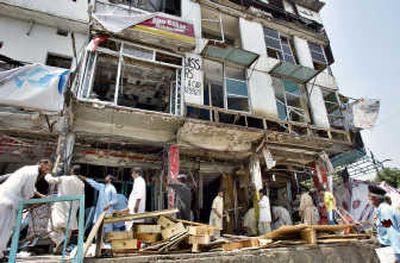Pakistan’s leader turns to rival

ISLAMABAD, Pakistan – President Gen. Pervez Musharraf’s suspension of Pakistan’s top judge triggered widespread national protests. His army’s assault on a radical mosque in the capital Islamabad sparked a new surge of Islamic militant violence.
On top of those domestic troubles, Musharraf is also under pressure from his key ally, the United States, which says the Taliban and al-Qaida have been allowed to regroup in Pakistan’s semiautonomous tribal belt near Afghanistan.
Now, with his grip on power seeming ever more tenuous, Musharraf is turning to a figure from his country’s past in an apparent bid to salvage his political future.
Musharraf held secret talks with opposition leader and former Prime Minister Benazir Bhutto, a government minister confirmed Saturday. Media widely reported that the once-bitter rivals discussed a power-sharing deal.
Such an alliance could strengthen Musharraf by bringing the secular, liberal opposition into his government as concerns grow about the rise in Islamic militancy. Analysts said Pakistan’s Western allies would welcome that.
But newspaper and television reports said the talks stalled over Bhutto’s insistence that Musharraf quit his military post if he hopes to remain president.
Minister for Railways Sheikh Rashid Ahmed said the president and Bhutto “held a successful meeting” in the Gulf emirate of Abu Dhabi on Friday. He would not elaborate on the subject of the talks.
Bhutto, leader of the secular Pakistan People’s Party, the country’s largest opposition group, told Pakistani television station KTN by phone from London that: “Whatever we have done and are doing it is for democracy and social and economic rights of the people of Pakistan.”
Musharraf seized power in a bloodless coup in 1999 and pledged to quickly restore democracy. He is expected to seek re-election when his term expires in October, and he wants the current crop of politicians in federal and provincial assemblies – who supported him five years ago – to vote again.
The opposition says the 2002 elections of those representatives were fixed and insists that only the lawmakers chosen in parliamentary elections due at the end of 2007 should have the right to elect the next head of state. Observers say the new crop of lawmakers may be less inclined to support Musharraf.
The opposition also says Musharraf must relinquish his post as army chief. But he has been unwilling to quit the army, the main source of his power, fueling disquiet about military rule.
Bhutto insisted Saturday that Musharraf must quit the military.
“Our stand is that, and I stick to my stand, that we do not accept President Musharraf in uniform,” she said.
Bhutto has also said Musharraf must promise to give up the power to fire the prime minister and dissolve parliament.
Widespread protests against Musharraf began after he suspended Supreme Court Chief Justice Iftikhar Mohammed Chaudhry in October. The government insists it received a string of credible complaints that the judge had abused his office. Critics accuse the government of trying to remove an independent-minded judge ahead of possible legal challenges to Musharraf’s continued rule.
Weakening Musharaff’s hold on power is militant violence that has surged since an army assault on the pro-Taliban Red Mosque earlier this month that killed at least 102 people. A controversial security deal with tribal leaders on the Afghan border, meant to contain Taliban and al-Qaida forces, collapsed in the face of violence that flared in reaction to the mosque raid.
Musharraf also faces rising criticism from Washington that al-Qaida and the Taliban have been allowed to regroup in Pakistan’s semiautonomous tribal belt near Afghanistan.
Investigators on Saturday sifted through the wreckage of the bombed-out restaurant where a suicide bomber blew himself up Friday and scoured a government identification card database to try to identify the attacker from remains found at the site.